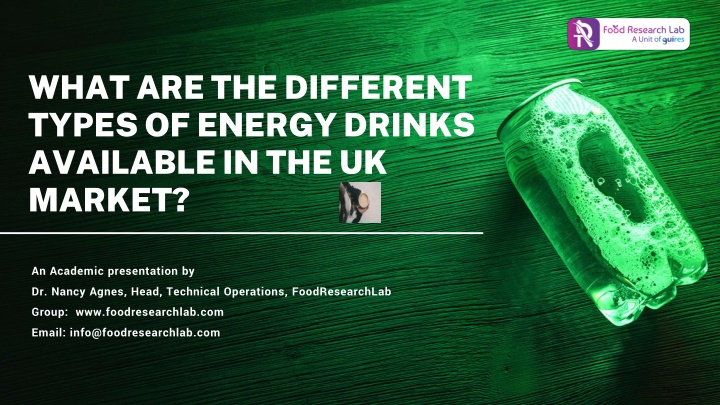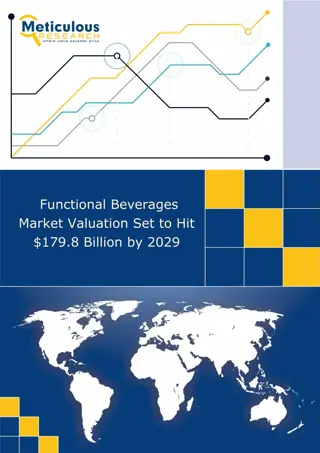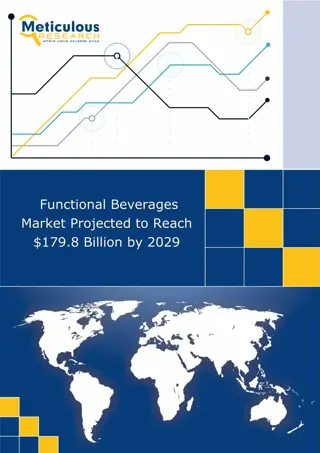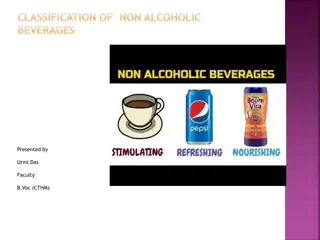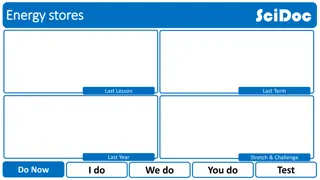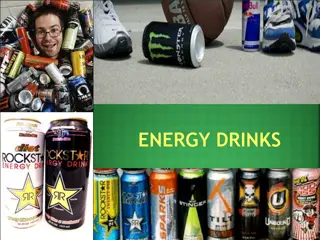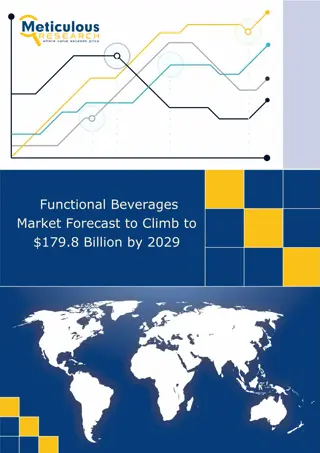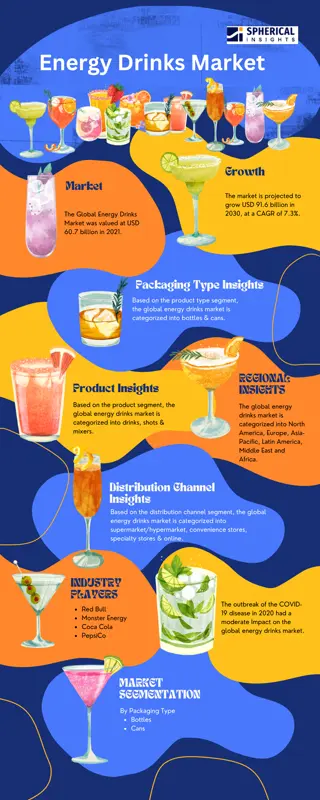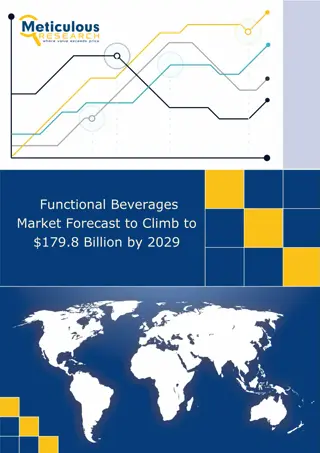What are the different types of energy drinks available in the UK market
The Food Research Lab is a state-of-the-art facility offering services in beverage formulation. We offer beverage formulation services and discuss the types of energy drinks available in the UK market. nnMore info >> // /blog/new-food-product-development/what-are-the-different-types-of-energy-drinks-available-in-the-uk-market/ nnContact Us nnUK- 44 161 394 1144 nnIndia - 91 9566299022 nnMail Id: info@foodresearchlab.com
Download Presentation

Please find below an Image/Link to download the presentation.
The content on the website is provided AS IS for your information and personal use only. It may not be sold, licensed, or shared on other websites without obtaining consent from the author.If you encounter any issues during the download, it is possible that the publisher has removed the file from their server.
You are allowed to download the files provided on this website for personal or commercial use, subject to the condition that they are used lawfully. All files are the property of their respective owners.
The content on the website is provided AS IS for your information and personal use only. It may not be sold, licensed, or shared on other websites without obtaining consent from the author.
E N D
Presentation Transcript
WHAT ARE THE DIFFERENT TYPES OF ENERGY DRINKS AVAILABLE IN THE UK MARKET? An Academic presentation by Dr. Nancy Agnes, Head, Technical Operations, FoodResearchLab Group: www.foodresearchlab.com Email: info@foodresearchlab.com
INTRODUCTION Energy drinks are a class of beverages believed to stimulate the Central Nervous System (CNS) to increase energy, enhance mental and cognitive performance and help stay awake. They were introduced in the market in 1987, although they may appear as a recent phenomenon. The principal constituent of energy drinks is caffeine, an alkaloid found in tea, coffee and soft drinks, a stimulating agent. Other sources of caffeine include guarana, cocoa, koala nut and yerba mate, and they are the other constituents of energy drinks. The caffeine content may vary from 50 to 500 mg per bottle, depending on the beverage manufacturer.
ENERGY DRINKS IN THE UK The consumption levels and the market size of energy drinks have been burgeoning [1]. In the UK alone, the energy drink market increased by 155% between 2006 and 2014, estimated at 1.48 million pounds [2]. Factors causing this growth are urbanisation, rising disposable income and growing health awareness, which drive consumers to prefer energy drinks over soft drinks. A changing lifestyle of the consumers that makes them participate more in sports activities is another factor in the growth. Innovations in beverage formulation for energy drinks also catalyse change in the energy drink market [3]. There are many different types of energy drinks available in the UK market. They are:
Standard energy drinks: These are the most common energy drinks and typically contain caffeine, taurine, B vitamins, and other ingredients to help boost energy and alertness. The combination of glucose and caffeine showed the maximum benefits on cognitive performance [4]. Sugar-free energy drinks: These are similar to standard energy drinks but do not contain any added sugar. They are popular with consumers watching their calorie intake or having dietary restrictions. The thermogenic effect is attributed to caffeine alone, which is shown to increase energy expenditure [5]. Natural energy drinks: These are made with natural ingredients such as green tea, guarana, yerba mate and ginseng instead of synthetic caffeine and taurine. They are promoted as a healthier alternative to standard energy drinks. Yerba mate is gaining popularity since it is rich in antioxidants and is proven to improve lipid metabolism. It also has cardioprotective and anti-diabetic properties [6].
Sports drinks: These are designed to help athletes, and active individuals rehydrate and replenish electrolytes lost during physical activity. They may also contain caffeine and other ingredients to help boost energy and performance. Innovations are occurring in beverage products for sports nutrition; they have become more specific concerning age, gender and the sports a person is involved in. In addition, beverage industries are formulating sports drinks using all-natural ingredients to meet consumers demands [7]. Energy shots: These are small, concentrated drinks that contain high levels of caffeine and other ingredients to provide a quick energy boost. They are marketed as a more convenient and portable alternative to standard energy drinks. Consuming energy shots have led to a subjective improvement in mood and performance. However, more studies must be conducted to determine their effects on humans [8]. Relaxation drinks: These are marketed to help consumers relax and reduce stress. They may contain melatonin, L-theanine, and chamomile [9].
CONCLUSION Energy drinks are a group of beverages known to increase energy, stamina and performance in sports. The principal ingredient is caffeine, which can vary greatly, depending on the brand. In addition, energy drink consumption is rising among the youth, and the side effects are more profound in this age group. Therefore, consumers must pay attention to the ingredients before consuming the product
HOW THE FOOD RESEARCH LAB CAN HELP The Food Research Lab is a state-of-the-art facility offering services in beverage formulation. It has a team of experts with over five decades of combined experience that assists its clients at every step of product development, from selecting natural ingredients and formulating the beverage that is minimally processed to pilot manufacturing, which enables the client to increase their efficiency in product development. It also assists in product packaging and marketing, ensuring that the product formulated is successful.
Contact Us UNITED KINGDOM +44- 161 818 4656 INDIA +91 9566299022 EMAIL info@foodresearchlab.com
